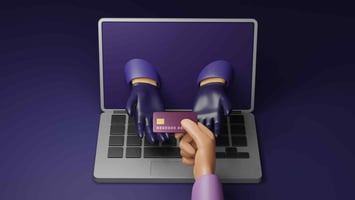It may come as a surprise to learn that official acceptance of the digital signature process has...

How Can Businesses Prevent Identity Fraud?
Identity fraud or theft involves stealing a person’s identity information for criminal activity. It can be challenging to uncover who has illegally accessed identity documents or data for individuals and businesses affected.
Recent figures show that 40 million UK adults were targeted by scammers during the first half of 2022, with approximately £580 million stolen by fraudulent actors in the UK between January and June of 2023.
Put simply, identity fraud is increasing and causing concern, particularly for financial organisations. Evidently, this clarifies the need for all organisations to secure privacy parameters that will keep customer information safe.
Identity fraud not only affects people who have their identity and personal details stolen, but also costs businesses dearly, increasing costs and causing reputational damage. This is where digital identity verification benefits businesses to maintain secure, compliant practices for a premium customer experience.
Contents
How is identity information stolen?
Key targets for identity theft.
How does identity theft work?
Why is identity verification software essential?
How to prevent identity fraud.
How is Identity Information Stolen?
There are multiple ways in which data can be taken illegally, whether this is through data leaks or cyber attacks. An identity thief will target businesses to capture large information collections to increase the likelihood of success in suspicious activity.
For any size of business, this has serious consequences in terms of financial losses and reputational harm. It appears that identity theft is a global threat, with compromised business email incurring an estimated $2.9 billion in victim losses in the U.S.
.png?width=1000&height=500&name=INTERBACS%20INFOGRAPHICS%20(2).png)
Some of the most common identity theft practices are:
- Phishing: individuals receive emails from seemingly legitimate businesses which are actually fake. These emails ask people to share names, addresses and other personal information.
- Cold calling: criminals call victims pretending to be their bank or other official organisation and deceive them into sharing information.
- Hacking: cyber criminals hack into business systems and access private information for illegal activity.
Key Targets for Identity Theft
According to the latest data, approximately two million British people have been victims of identity theft by having had personal information stolen, which has then been used by criminals to set up financial accounts during 2023. But what information is the most useful to fraudulent actors?
- Financial information and financial statements. This type of data is valuable to thieves as they can use it to access your bank statements and financial accounts and set up new ones.
- Medical identity details. Accessing medical records can enable criminals to mine health insurance accounts and create fraudulent medical claims.
- Employment identification. Having access to tax or national insurance information can be useful for cyber criminals who use this data to imitate individuals’ identities.
How does Identity Theft Work?
Although these steps are not conclusive, identity fraud may follow this general pattern:
Step 1
Accessing personal documents and information. This may occur physically through the theft of sensitive documents or through hacking and phishing to secure personal data.
Step 2
Using data for fraud. Identity thieves will use this data to open bank accounts, credit cards or take out loans.
Step 3
Covering tracks. Personal data will be used to conceal theft in the hope the criminals will not be discovered.
Step 4
Checking out. Criminals will steal cash and other financial assets or take out loans, then disappear.
Why is Identification Verification Software Essential?
Businesses understand that digital identity verification is an important part of securing information privacy - both for companies and customers.
In fact, personal identity verification is not just a desirable element in business, it is a legal requirement to ensure customer information is kept confidential.
In order to meet regulatory compliance requirements, such as those detailed in regulations Know Your Customer (KYC) and General Data Protection Regulation (GDPR), businesses must clearly evidence how they are protecting and storing customer information.
Secure and lasting identity verification relies on the fundamental principles of compliance. When businesses prove the identity of their customers with compliant evidence, they are reducing the risks of fraud and indemnity claims for their customers.
In truth, businesses that optimise digital identity verification within their systems are able to increase security and meet legal obligations. Additionally, this facilitates the ability to avoid weighty fines and regulatory restrictions, helping them to inspire customer loyalty whilst driving business growth.
How to Prevent Identity Fraud
Cyber crime is now responsible for daily identity theft attacks around the world. Experts are predicting a rise in global crime to reach $23.84 trillion by 2027, and as such, personal identity verification software has never been more necessary for businesses and individuals alike.
Businesses want to nurture stronger customer relationships and access greater growth opportunities. With reliable digital identity verification software in place, companies can eliminate the risk of identity theft and comply successfully with legal regulation.
To prevent identity fraud and indemnity claims, we recommend our digital identity verification solution, Interpass. It is tailor-made to overcome the challenge of digital customer protection, empowering businesses to benefit from truly secure data management systems.
Browse our insights or book a free demo with our friendly experts today to find the real difference Interpass will make to your own organisation.


